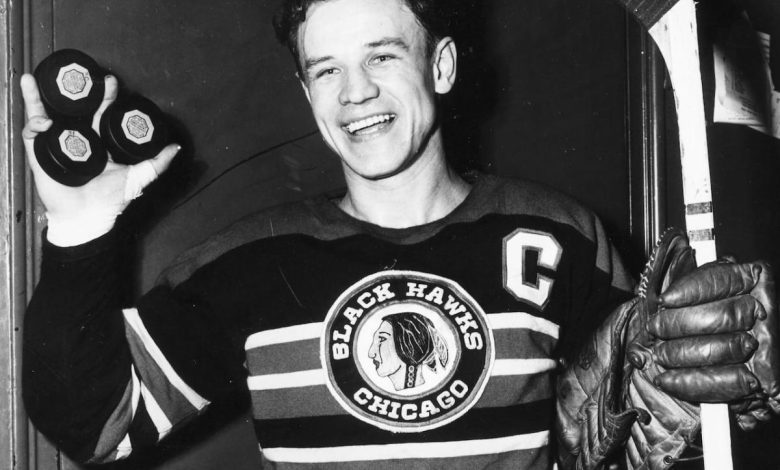Winnipegger notched NHL record in 1952 that might never be broken

Winnipegger notched NHL record in 1952 that might never be broken
The Winnipeg Jets started this year by setting an early-season winning record, but the city has another connection to a quick mark in the NHL that may never be matched.
Billy Mosienko was already a star winger for the Chicago Blackhawks when, in 1952, he became a legend.
On March 23, the agile five-foot-eight skater from Winnipeg’s North End lit the goal lamp three times in 21 seconds.
“It’s just an incredible record from an incredible guy. I think it’s going to stay forever,” said Winnipegger Ty Dilello, author of Mosienko: The man who caught lightning in a bottle.
Dubbed the Mosienko miracle, the feat sparked a comeback that carried Chicago from a 6-2 third-period deficit to a 7-6 victory over the New York Rangers.
“It’s remarkable. It’s so difficult for a player to score even two goals in that time,” said Dilello, an accredited writer with the International Ice Hockey Federation and member of the Society. for International Hockey Research.
“A lot of things had to go right.”


Bill Mosienko on a 1954 Topps hockey card is a member of the Hockey Hall of Fame, Manitoba Sports Hall of Fame and Manitoba Hockey Hall of Fame. (1954 Topps Hockey)
The NHL was then a six-team league, and only the top four teams made the playoffs. In 1952, New York was fifth and Chicago sixth.
The result meant nothing, so few saw this historic spectacle in person. Only 3,254 of Madison Square Garden’s 15,925 tickets were sold.
The Rangers signed goaltender Lorne Anderson from their farm team, while defenseman Hy Buller was skating on a cracked ankle.
But none of that diminishes Mosienko’s achievement, Dilello said.
“Three goals in 21 seconds is such a rare rarity that I don’t really think it matters. It would be difficult enough to achieve against a minor league team. It’s just an incredible feat .”


Bill Mosienko throws the puck past Lorne Anderson for his hat trick goal on March 23, 1952. Anderson’s glove, next to Mosienko’s skate, flew off in his attempt to make the save. (Hockey Hall of Fame)
Mosienko, who was temporarily serving as captain, scored his first goal with about 13 minutes remaining in the match.
He received a pass from Gus Bodnar, went around Buller, cut in front of Anderson and slipped the puck under the goalie’s gloved hand at 6:09.
The next goal was a carbon copy. From the faceoff, Bodnar found Mosienko at the Rangers blue line, where the winger dodged Buller and beat Anderson, again under the glove, at 6:20.
The third goal came 10 seconds later as Bodnar fed the puck to George Gee, who sent a flying cross from Mosienko into the middle of the Rangers zone.
Anderson fell low in anticipation. An alert Mosienko instead flipped the puck over the glove at 6:30.
“Bad time to go to the bathroom,” Dilello said, wondering how many people in attendance saw what was happening in the ticks it takes for a heart to beat 30 times.


The NHL game scoreboard shows Mosienko’s hat trick. (NHL/YouTube)
Until this day, the hat trick record belonged to Carl Liscombe of the Detroit Red Wings, who accomplished it in 1 minute and 52 seconds against the Blackhawks in 1938.
Mosienko nearly added a fourth goal about 45 seconds later.
“I was alone again. I pretended to be out of Anderson’s position, had an open goal to hit and shot wide,” he said in the book, The Game I’ll Never Forget: 100 Stories of Hockey Starsby Chris McDonnell.
He told reporters after the match that he had simply been lucky and had “caught lightning in a beer bottle.”
That modesty was a trait of a man who is also remembered as one of the kindest individuals in the world, Dilello said.
“There may have been better hockey players in Manitoba, but as an ambassador for the sport, I don’t think there’s one better than Bill Mosienko,” he said.
“He was literally friends with everyone. Just a real gem.”
During the 1944–45 season, Mosienko was voted by fans as the most popular Blackhawk and won the Lady Byng Memorial Trophy as the NHL’s most gentlemanly player, finishing sixth in the league standings without conceding only one penalty.


Newspaper headlines from Corner Brook’s Western Star, left, and the Winnipeg Tribune, March 24, 1952, the day after Mosienko’s record-breaking night. (The Western Star/The Winnipeg Tribune)
The pucks from those record goals sat for years in a desk drawer in the basement of the family home, said Mosienko’s son, also named Bill, who is 77 and lives in Interlake near Lundar, Man. .
“When I was a kid, I would handle them and they would be labeled with the goal numbers,” he said.
They and the wooden stick that served as a lightning rod are now on display at the Hockey Hall of Fame in Toronto.
Next to them is a blown-up photo of a beaming Mosienko holding the pucks in his taped hands.
“It’s nice to have that memory, and a lot of people talk about it,” Bill said. “I was once stopped by the police on the highway [for a spot check]and the guy said, ‘Oh, I know your name.’ Yeah, that’s something else.”
Bill never felt the weight of expectations as the son of a hockey legend. Quite simply, this gene passed it on.
“I wasn’t that good,” he says, laughing. “I went skating with him one night and he just ran circles around me. I was 18, he was in his 40s.”
He wore number 8, but there was clearly something special about 21 for Mosienko, who was born in 1921 and scored his first two NHL goals 21 seconds apart – also against the Rangers.
He retired after the 1954-55 season as a five-time All-Star and played his entire career with Chicago.
Mosienko’s final NHL goal came, fittingly, against the Rangers.


Billy Mosienko’s jersey from the 1950 All-Star Game. (Submitted by the Mosienko family via Ty Dilello)
He then joined the Winnipeg Warriors minor professional team and helped them win the championship in their inaugural 1955–56 season. Mosienko played for four seasons and was named an All-Star three times.
He is a member of the Hockey Hall of Fame, the Manitoba Sports Hall of Fame and the Manitoba Hockey Hall of Fame.
In 1991, the City of Winnipeg renamed Keewatin Arena Bill Mosienko Arena in his honor. He died three years later from brain cancer at the age of 72.
His career and record-breaking hat trick are also honored in a mural on the side of a bowling alley that he and former teammate Joe Cooper opened in 1947 in the North End, about a 20-minute walk from the house Mosienko’s childhood home on Granville Street.


A mural of Bill Mosienko, painted by his daughter-in-law Jen Mosienko, was erected on the side of the bowling alley in 2016. (Jaison Empson/CBC)
Originally called Cooper-Mosienko Lanes, Mosienko later bought out his partner. He renamed it Billy Mosienko Lanes and was there often with his trademark smile.
“He was a people person. He loved meeting people, he loved talking to people,” Bill said.
The alley, with its giant bowling sign near Main Street and Redwood Avenue, is still there but no longer owned by the Mosienko family.
The company will one day disappear, as the Jets’ 2024 season begins, but Mosienko’s name and accomplishments may live on.
“He will be remembered forever,” Dilello said. “There has never been a player who has scored three goals in this period in the last 50 years. It’s one of a kind.”
Actually, a set.
2024-12-29 12:00:00





